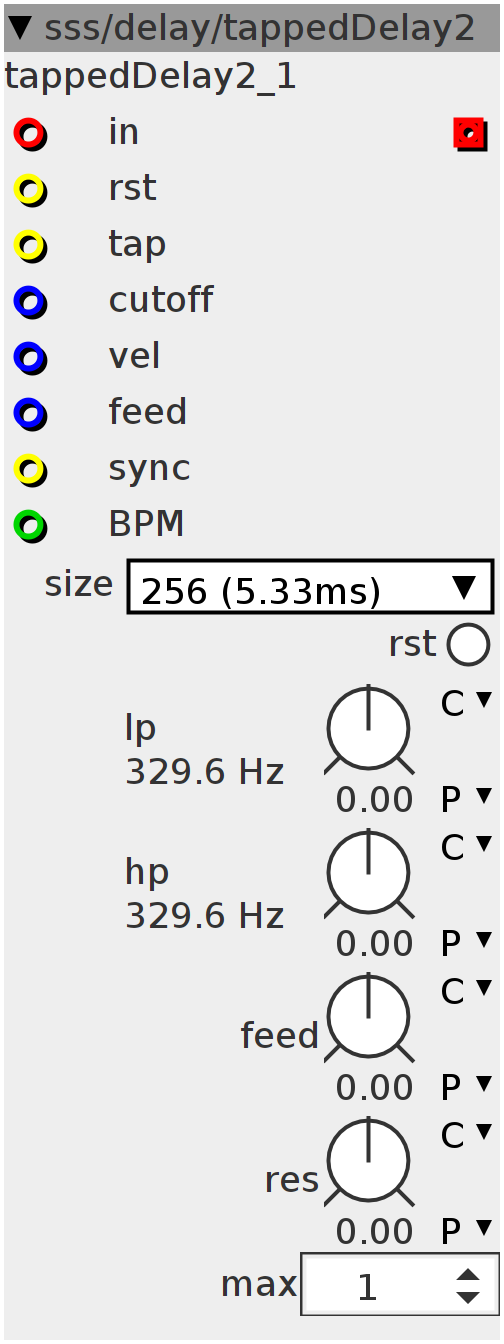tappedDelay2
multi-tap delay with lowpass filter on each tap. You enter the tap-velocity/timing/cutoff for each tap by external tapping. eg. when using a midi note module: connect gate-output of midi module to the tap-input of this module connect note-output of midi module to the cutoft-input of this module connect velocity-output of midi module to the vel-input of this module first tap you play will reset the timing-counter to the "zero" position->incoming note taps after this will set the timing/velocity/cutoff of the delays. when you want to set new timings for the delay, just hit "rst" and play a new rhythm. on-module cutoff-knob is added to the recorded cutoff.
Inlets
frac32 cutoff
frac32 vel
frac32 feed
int32 BPM
frac32buffer wave input
bool32 rst
bool32 tap
bool32 sync
Outlets
frac32buffer out
Parameters
frac32.s.map.pitch lp
frac32.s.map.pitch hp
frac32.s.map feed
frac32.s.map res
int32 max
bool32.mom rst
Attributes
combo size
static const uint32_t LENGTHPOW = (attr_size);
static const uint32_t LENGTH = (1 << attr_size);
static const uint32_t LENGTHMASK = ((1 << attr_size) - 1);
int16_t *array;
uint32_t writepos;
int delays;
int Dels;
int32_t times[16];
int32_t velocity[16];
int32_t f[16];
int32_t g[16];
int32_t h[16];
int32_t val[16];
int32_t vol[16];
int gtrig;
int rtrig;
uint32_t count = 0;
int start;
int i;
int32_t out;
int trig;
uint32_t Count;
uint32_t Time;
int BPM;static int16_t _array[1 << attr_size] __attribute__((section(".sdram")));
array = &_array[0];
writepos = 0;
for (i = 0; i < LENGTH; i++)
array[i] = 0;
delays = 0;
start = 1;
Count = 1 << 31;
Time = 1 << 31;int rst = inlet_rst + param_rst;
int32_t MAX = LENGTH / Time * Time;
if ((rst > 0) && !rtrig) {
delays = 0;
Dels = 0;
start = 1;
rtrig = 1;
BPM = inlet_BPM;
count = 0;
} else if (rst == 0) {
rtrig = 0;
}
float32_t ratio;
ratio = (float32_t)BPM / inlet_BPM;
if ((inlet_tap > 0) && !gtrig) {
if (start == 1) {
count = 0;
start = 0;
}
if (delays > 0) {
times[Dels] = count;
g[Dels] = inlet_cutoff;
velocity[Dels] = inlet_vel << 2;
}
Dels += 1;
Dels = Dels > param_max ? 0 : Dels;
delays = Dels > delays ? Dels : delays;
gtrig = 1;
} else if (inlet_tap == 0) {
gtrig = 0;
}
int32_t feed = __SSAT(param_feed + inlet_feed, 27);
if (delays > 0) {
for (i = 0; i < (delays - 1); i++) {
MTOF(g[i] + param_lp, f[i])
MTOF(g[i] + param_hp, h[i])
}
}Count += 1;
if ((inlet_sync > 0) && !trig) {
trig = 1;
Time = Count;
Count = 0;
} else if (inlet_sync == 0) {
trig = 0;
}
writepos = (writepos + 1) & LENGTHMASK;
array[writepos] = __SSAT((inlet_in + ___SMMUL(feed << 2, out << 2)) >> 16, 16);
count += 1;
count = count - count / MAX * MAX;
out = 0;
int32_t tmp;
if (delays > 0) {
for (i = 0; i < (delays - 1); i++) {
tmp = ___SMMUL(array[(writepos - (int32_t)(times[i] * ratio)) & LENGTHMASK]
<< 19,
velocity[i]) -
___SMMUL(param_res << 3, val[i] - vol[i] << 2);
val[i] = ___SMMLA((tmp - val[i]) << 1, f[i], val[i]);
vol[i] = ___SMMLA((val[i] - vol[i]) << 1, h[i], vol[i]);
out += val[i] - vol[i];
}
}
outlet_out = out + inlet_in;